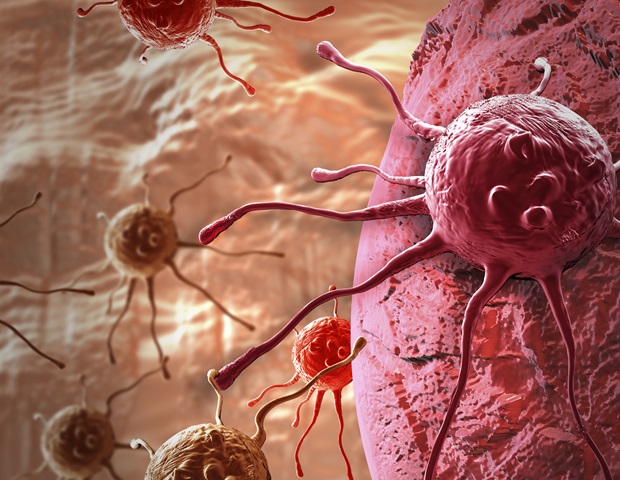Health
Researchers Boost T Cell Power Against Cancer by Reprogramming Metabolism

Researchers have made significant strides in enhancing the immune system’s T cells to combat cancer more effectively. By blocking a protein known as Ant2, a team led by PhD student Omri Yosef and Prof. Michael Berger from the Faculty of Medicine at Hebrew University has reprogrammed how these cells produce and consume energy. This alteration enhances the T cells’ activity, resilience, and ability to attack tumors, paving the way for innovative cancer therapies.
The study, published in Nature Communications, highlights a crucial finding: when T cells are compelled to change their energy conversion processes, their efficiency at identifying and eliminating tumors increases dramatically. The research involved collaboration with Prof. Magdalena Huber from Philipps University of Marburg and Prof. Eyal Gottlieb from the University of Texas MD Anderson Cancer Center, showcasing a global effort to improve cancer treatment.
At the core of this research is the mitochondria, often referred to as the “metabolic hub” of cells. By disrupting a specific energy pathway within the T cells, the researchers essentially rewired the cells’ internal mechanisms, resulting in heightened readiness and enhanced capabilities. The altered T cells demonstrated increased stamina, quicker replication, and more precise targeting of cancerous cells.
Prof. Berger elaborates on their findings: “By disabling Ant2, we triggered a complete shift in how T cells produce and use energy. This reprogramming made them significantly better at recognizing and killing cancer cells.” By blocking this protein, the immune cells adapt their metabolism, transforming them into more robust, faster, and more aggressive defenders against cancer.
Perhaps most noteworthy is the potential for clinical applications. The team revealed that this metabolic rewiring could be achieved not only through genetic modifications but also via pharmacological interventions. This discovery is part of a broader trend in cancer immunotherapy aimed at not just directing the immune system but also enhancing its internal functions.
As the research progresses, the implications of these findings are promising. The goal is to develop new treatments that leverage the body’s innate defenses, fine-tuning them for optimal performance.
“This work highlights how deeply interconnected metabolism and immunity truly are,”
says Prof. Berger. “By learning how to control the power source of our immune cells, we may be able to unlock therapies that are both more natural and more effective.”
The study, cited as Yosef, O., et al. (2025), illustrates a pivotal moment in the fight against cancer, offering hope for therapies that harness the body’s own mechanisms to combat disease more effectively. As further studies and clinical trials are initiated, the research holds the potential to transform the landscape of cancer treatment, moving towards approaches that are not only innovative but also grounded in the body’s natural immune responses.
-

 Entertainment2 months ago
Entertainment2 months agoIconic 90s TV Show House Hits Market for £1.1 Million
-

 Lifestyle4 months ago
Lifestyle4 months agoMilk Bank Urges Mothers to Donate for Premature Babies’ Health
-

 Sports3 months ago
Sports3 months agoAlessia Russo Signs Long-Term Deal with Arsenal Ahead of WSL Season
-

 Lifestyle4 months ago
Lifestyle4 months agoShoppers Flock to Discounted Neck Pillow on Amazon for Travel Comfort
-

 Politics4 months ago
Politics4 months agoMuseums Body Critiques EHRC Proposals on Gender Facilities
-

 Business4 months ago
Business4 months agoTrump Visits Europe: Business, Politics, or Leisure?
-

 Lifestyle4 months ago
Lifestyle4 months agoJapanese Teen Sorato Shimizu Breaks U18 100m Record in 10 Seconds
-

 Politics4 months ago
Politics4 months agoCouple Shares Inspiring Love Story Defying Height Stereotypes
-

 World4 months ago
World4 months agoAnglian Water Raises Concerns Over Proposed AI Data Centre
-

 Sports4 months ago
Sports4 months agoBournemouth Dominates Everton with 3-0 Victory in Premier League Summer Series
-

 World4 months ago
World4 months agoWreckage of Missing Russian Passenger Plane Discovered in Flames
-

 Lifestyle4 months ago
Lifestyle4 months agoShoppers Rave About Roman’s £42 Midi Dress, Calling It ‘Elegant’









